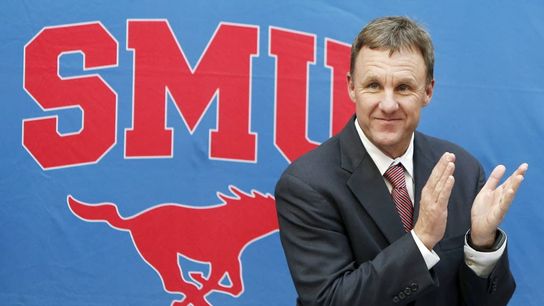Chad Morris appeared on Dallas radio station KTCK The Ticket on Thursday, fanning the flames for SMU football amidst a week filled the Texas Rangers' opening day, a Dallas Mavericks playoff push, local boy Jordan Spieth leading The Masters and NASCAR in town at Texas Motor Speedway. Such is life when you're the SMU head football coach.
The rebuilding job ahead of Morris is clear and obvious. He's got to take a team among the worst in FBS a year ago and remake it into something completely different than that. And that starts, Morris said, with teaching players how to practice.
"You have to teach them how to practice. As a coach those are things we take for granted so many times. 'Well, this guy knows how to practice, yeah they know how to practice, how to work out.' Well, it starts with strength and conditioning, in our weight room. It's a belief that starts on the first floor and works its way up," he said. "When those guys understand it's so much about conditioning, and really your big guys, that's what you have to sell. We've got skill guys running 7,500 yards, 8,000 yards every practice, and we monitor them. We've got a monitor on them. We have a GPS device on our players."
Host Norm Hitzges practically leapt out of his chair when learning Morris equips his players with GPS monitors.
"I had to learn this the hard way," he said. "My first year at Clemson, obviously we won the ACC, we were 8-0, No. 3 in the country and I physically ran our offensive players in the ground. Sammy Watkins, Nuke Hopkins, we were running 7,000 yards every practice. We hit a point in time when I really needed them to play well and they were gassed. They were gassed. And it wasn't their fault. We were teaching them how to practice. They had never been a part of this offense. We were having success, playing great early, but they were gassed. In going back and looking at it I said, 'Wow, I did this.' We had to do a better job of how we monitor so we started putting GPS devices on our players. Right now we've got one of our players, Cortland Sutton, he averages about 7,300 yards every practice he steps on the field. Not only those guys got to run, but your big guys have to run too."
"The one thing I tell those guys is, 'When you can look over there at those defensive linemen,' and we will really stop a play and anytime a defensive lineman has their hands on their hips, hands on their knees, we'll say we've got them. We've got 'em. Well tell our guys that fatigue makes cowards out of everybody, so the quicker we can fatigue them, we've got them."
In other notes, Morris explained the thesis statement for his offensive - and program - mission in what sounds to me like a tag line for the next Fast and Furious installment: "Fast as you can possibly move."
"Break-neck speed. Fast as you can possibly move," he said. "We want to be a two-back, run-oriented, play-action shot football team. As fast as you possibly can. Not just, we're a hurry-up, no-huddle offense, we're a hurry-up, no-huddle program. From an offense to a defense. Obviously if we're a hurry-up, no-huddle offense our defense is having to play a hurry-up as well every day. And we tell our defense all the time, 'You're not going to play anybody faster than us, so right now this is a great opportunity for you to learn.' We're all going to play fast in all aspects of the game."
I shared this on Twitter yesterday but Morris, though one may assume he was geared toward a life in coaching from the time he was in diapers, actually never planned on coaching. Far from it, in fact. Childhood Chad Morris was obsessed with numbers and wanted to be an actuary one day.
"Outside of my parents being so instrumental in my life, a high school coach that taught math was the next most influential person in my life and that kind of directed me toward the math route. Loved numbers, was fascinated, would always get up and look at the sports page and figure batting averages, and was just constantly consumed with numbers as I was growing up," he said. "That's kind of the direction it went, and really coaching and teaching was not going to be part of my life. I had no desire to do that. I wanted to get in the actuarial field and really get involved with the probabilities of things. That's kind of how that happened."
